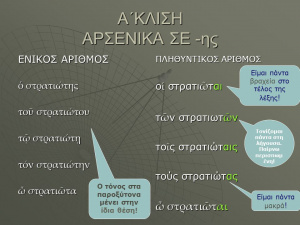Difference between revisions of "Language/Ancient-greek-to-1453/Grammar/Ancient-Greek-First-Declension"
| Line 245: | Line 245: | ||
V | V | ||
| colspan="4" |-αι | | colspan="4" | -αι | ||
-ῶν | -ῶν | ||
| Line 257: | Line 257: | ||
|} | |} | ||
{| class="wikitable" | {| class="wikitable" | ||
|'''Attention:''' | | | ||
''' '''γῆ, γῆς (earth)''' : | === '''Attention:''' === | ||
|''' | |||
=== ''' '''''γῆ, γῆς (earth)''' : No plural''''' === | |||
|'''''Second type of noun''''' | |||
'''''Second type de nom: la terre / earth''''' | |||
|- | |- | ||
| | | | ||
Revision as of 10:56, 29 June 2020
The nouns of the first declension - Πρώτη κλίση ουσιαστικών
Ελληνικά |
English |
Français |
|---|---|---|
| Τα ουσιαστικά στην αρχαία ελληνική γλώσσα
διακρίνονται σε τρεις κλίσεις: α΄ κλίση, β΄ κλίση, γ΄ κλίση Οι αριθμοί των ουσιαστικών, όπως και των άλλων πτωτικών, είναι τρεις: ο ενικός, ο δυϊκός και ο πληθυντικός. |
In Ancient Greek, all nouns are classified
according to grammatical gender (masculine, feminine, or neuter) and are used in a number (singular, dual, or plural). All Greek nouns belong to one of three inflection patterns, called the : first (α΄) declension, second (β΄)declension, and third (γ΄) declension. Each represents a particular set of case endings for gender, number, and case. This lesson introduces first (α΄) declension nouns. The nouns of the first declension end in : |
Α΄ Déclinaison
La première déclinaison comporte essentiellement des noms féminins et masculins qui terminent en : |
Ελληνικά |
| Η πρώτη κλίση στα αρχαία ελληνικά περιλαμβάνει ονόματα αρσενικά και θηλυκά.
Στα αρσενικά ανήκουν όσα λήγουν σε: 1. -ης, π.χ. στρατιώτης και σε 2. -ας, π.χ. λοχίας Στα θηλυκά ανήκουν όσα λήγουν σε: 1. -η, π.χ. ψυχή, μουσική και σε 2. -α, π.χ. ὥρα, γλῶσσα Χρειάζεται προσοχή, γιατί από τα θηλυκά σε -α άλλα 1. σχηματίζουν τη γενική σε -ας, π.χ. ὥρα, ὥρας και άλλα 2. σχηματίζουν τη γενική σε -ης, π.χ. γλῶσσα, γλώσσης. |
English |
| Are masculine : nouns of end in:
1. –ης : στρατιώτης (soldier , but in the speeches ἄνδρες στρατιῶται :soldiers!) end in 2. –ας : λοχίας (sergeant ) are Feminine : nouns of end in: 1. –η : ψυχή (psyche ), μουσική (music ) *2. –α : ὥρα (hour ), γλῶσσα (tongue) * any art over which the Muses presided : poetry sung to music, generally art or letters ** The plural genitive is always perispomene (~ ): θυρ-ῶν, γλωττ-ῶν. |
Français |
| α ) féminines : ces qui se terminent :
1) -η : ψυχή (l’âme), μουσική (la musique) *et en 2) -α : ὥρα (l’heure ), γλῶσσα (la langue ) β) masculins (noms d'hommes, de métier, et noms propres) en : 1) -ης : στρατιώτης (le soldat, mais dans les discours ἄνδρες στρατιῶται soldats !) et en 2 ) -ας : λοχίας (le sergent / sergeant ) La prudence est de mise, car les féminines en -α 1. forment le génitif en -as, par ex. N : ὥρα, G : ὥρας et d'autres 2. forment le génitif en -ης, par ex.: N : γλῶσσα, G : γλώσσης
** Le génitif pluriel est toujours périspomène (~ ) : θυρ-ῶν, γλωττ-ῶν. |
| ||||||||||||||||||
| ||||||||||||||||||||||||||||||
Attention:γῆ, γῆς (earth) : No plural |
Second type of noun
Second type de nom: la terre / earth | ||||||||||||||||||||||||
|
| ||||||||||||||||||||||||
Ευγενική χορηγία που στοχεύει να βοηθήσει μαθητές ή μη, απανταχού της Γης,που επιδίδονται στην εκμάθηση της ελληνικής γλώσσας!!!Sponsorisé d'amabilité visant à aider des étudiants ou non, partout sur Terre,qui sont engagés sur l'apprentissage de la langue grecque !!! |
